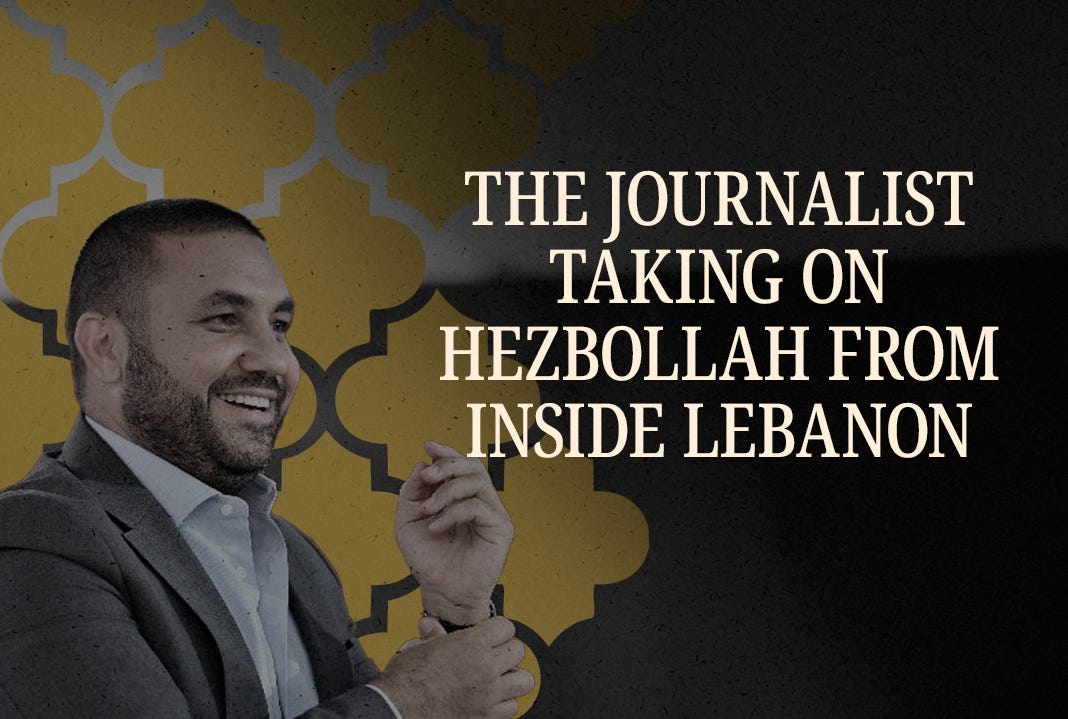The Journalist Taking on Hezbollah From Inside Lebanon
For decades, Hezbollah has framed itself as the defender of Lebanon’s Shia. Mohammad Barakat’s dissent shows that many now reject endless war in favor of normal life.
For decades, Hezbollah has claimed to be the voice of Lebanon’s Shia muslims. With its arsenal of weapons, its grip on politics, and its patronage from Iran, the group has constructed a mythology: without Hezbollah, Lebanon’s Shia would be defenseless and voiceless. But listen closely to dissidents inside the community, and a different story emerges.
Mohammad Barakat, a Lebanese Shia journalist and editor, has become one of the most fearless critics of the group’s monopoly on power. He boldly asserts that it does not represent him, his family, or the millions of ordinary Shia who seek dignity and prosperity instead of endless war.
“Our house was a house of resistance before Sayyid Hassan was even born,” Barakat says, rejecting Hezbollah’s claim to have invented Shia defiance. His family’s history of resistance predates Hassan Nasrallah (the late secretary-general of Hezbollah), and it was never dictated by Tehran. “If you’re a Shia but don’t say what Iran wants, then you’re branded a heretic,” he recalls, noting that in the 1950s his political icon was not a Shia cleric but Gamal Abdel Nasser, a Sunni Arab nationalist.
Barakat ridicules Hezbollah’s imperial delusions: “Nine hundred thousand Shia cannot rule Bilad al-Sham. Impossible.” The idea that Lebanon’s Shia, less than a million people, can dominate the Levant is not just absurd, it is destructive. “We are 900,000 Shia, are we supposed to ‘liberate Palestine’? They dragged us into madness: madness of power, madness of grandeur, and now absolute madness.”
What Barakat offers instead is a vision rooted in everyday life: factories, restaurants, and tourism in South Lebanon, not rocket launchers and refugee camps. “Most Shia don’t want to be displaced or refugees,” he says. When Hezbollah leaders declare that Lebanon must live in tents, Barakat snaps back: “Who told you we want to live in tents?”
Hezbollah’s followers, he argues, are intellectually bankrupt: “They have nothing left but insults and cursing.” Once the self-styled champions of dignity, they now survive on smears, harassment, and threats. Barakat himself has been targeted by fake news campaigns, including false reports of his arrest circulated on WhatsApp. He shrugs it off: “Fear doesn’t work on me.”
In August, the Lebanese cabinet authorized the army to prepare a plan to bring all weapons under state control—a decision Hezbollah condemned as a “grave sin” before its ministers stormed out of the session.
Hezbollah MP Mohammad Raad recently warned that disarming the group would endanger Lebanon’s “civil peace.” Barakat exposes the bluff: “Civil peace today is guaranteed by the constitution and by Taif, not by Hezbollah’s guns.” The Taif Agreement of 1989 settled the matter: only the state has the right to arms.
Days later, Israeli airstrikes deep inside Lebanon’s Bekaa region killed four Hezbollah fighters, demonstrating just how dangerous the group’s continued militarization has become for ordinary Lebanese who have no say in its war plans.
Barakat dismisses Hezbollah’s tantrums and threats as empty rage. Even the Amal Movement, their longtime Shia ally, accepted the government’s decisions outright, only accusing the cabinet of “haste.” And to the claim that Lebanon cannot function without Hezbollah’s Shia ministers, Barakat is equally unsparing: “There are replacements for Shia ministers if necessary. No community can hold the country hostage.”
Hezbollah’s Deputy Secretary-General Naim Kassem recently warned Gulf countries that they would be “next” if Israel succeeds in dismantling regional militant networks—a threat that drags Lebanon further into conflicts not of its choosing. Meanwhile, the human toll of Hezbollah’s confrontations continues to surface. A year after Israeli sabotage attacks targeting the group’s communications gear, many civilians are still recovering from maiming injuries. For Barakat and other dissident Shia voices, these events only confirm what they have long argued—that Hezbollah’s guns no longer protect Lebanon but imperil it, holding the country hostage to an endless cycle of provocation and reprisal.
This is why Barakat’s voice matters. Hezbollah thrives on the illusion that it embodies Lebanon’s Shia community. But his loud, unyielding opposition punctures that illusion—and he is not alone. Across the region, more Shia voices are rejecting Tehran’s militias and choosing sovereignty over servitude.
Hezbollah promised liberation but delivered ruin. Barakat’s dissent shows that another Shia identity is possible, one that is Lebanese, nationalist, and free from Iran’s grip. The real guarantor of dignity is not the barrel of a gun but the sovereignty of a state and the safety of its people. And when Hezbollah is finally disarmed, Lebanon will not collapse. On the contrary, it may finally have a chance to breathe.
Middle East Uncovered is powered by Ideas Beyond Borders. The views expressed in Middle East Uncovered are those of the authors and do not necessarily reflect the views of Ideas Beyond Borders.




Informative article, I hope things change and Lebanon will be free, not held hostage as they have been for some time.